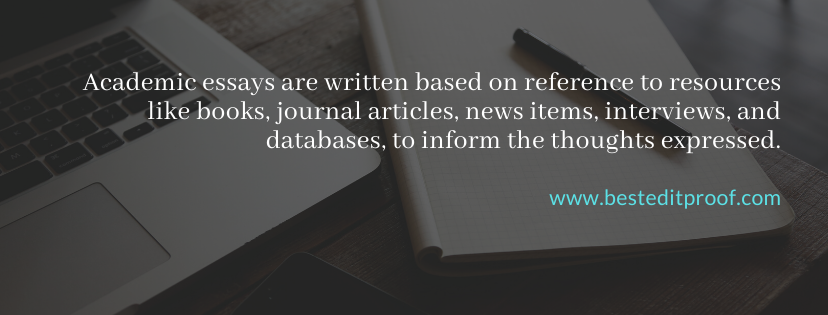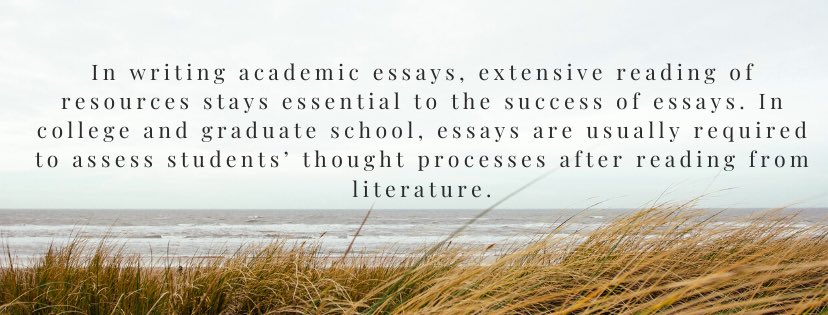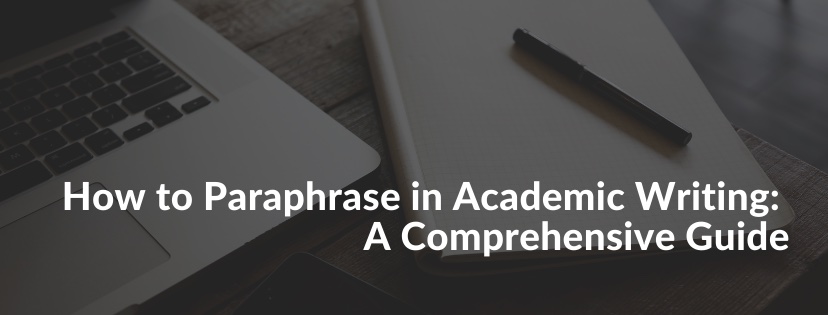Writing academic essays is required for the successful completion of college, graduate school, and advanced research studies. Essay writing, as required in academia, requires much more preparation, effort, and skill than most students and academics actually do put in.

This handout provides some tips and strategies for writing academic essays. To give you an opportunity to practice proofreading, we have left a few spelling, punctuation, or grammatical errors in the text. See if you can spot them! If you spot the errors correctly, you will be entitled to a 10% discount.
Writing academic essays is required for the successful completion of college, graduate school, and advanced research studies. Essay writing, as required in academia, requires much more preparation, effort, and skill than most students and academics actually do put in. For students, poorly written academic essays may result in failure of a college or graduate-level course, whereas academics may have their papers rejected by journal editors, and consequently face the risk of losing grants and the opportunity to share their results from years of research with the world. This article provides 10 resourceful tips for students and academics to master the art of writing academic essays and enhance the communication of their science.
Before writing academic essays, the author has to assess the extent of work needed, as different types of essays require different levels of preparation, resources, skill, and effort. This assessment should be conducted at the initial stages of writing academic essays. The best time to start is when ideas and perspectives are still fresh. It is important to consider available time, resources, and data. Failure to conduct this assessment exposes the student or academic to the risk of being overwhelmed by the extent of work needed and may lead to missing deadlines.
After assessing the extent of work needed, plan and stick to a suitable timeline with the deadline in focus. Usually, longer timelines are allocated for writing academic essays. Due to this, one may procrastinate on tasks. At best, do not procrastinate, but if you do, be cautious to commence work at a time that would align with the assessment made, as explained above.
Academic essays are written based on reference to resources like books, journal articles, news items, interviews, and databases, to inform the thoughts expressed. It would be expedient to find enough resources at an early stage and on a daily basis. With this approach, one can find more than enough resources for writing academic essays and further prevent constructing skewed arguments. These resources should be organized in named folders to facilitate retrieval whenever needed.

In writing academic essays, extensive reading of resources stays essential to the success of essays. In college and graduate school, essays are usually required to assess students’ thought processes after reading from literature. Therefore, failure on the part of students to read resources extensively, defeats this purpose. In addition, reading abstracts and introductory paragraphs only makes one prone to under-information and misinformation, as abstracts and introductory paragraphs and sections only provide summaries. To gather accurate information for writing academic essays, the author must not forego the discussion section in academic research articles.
The author must note information that will potentially aid in the synthesis of the essay. The risk involved in omitting or misquoting essential data from resources is reduced when such information is documented. Intellectual property is highly regarded in academia; thus, plagiarism should not be tolerated when writing academic essays. To avoid plagiarism, one must concurrently cite resources at this stage of the writing process. Consequently, compliance with this tip eases the author of extraneous work during the proofreading and editing stage.
After reading from literature’s pool of diverse thoughts, findings, and ideas, the author must now rightly synthesize his/her thoughts, analyze data and findings, and consequently decide on a conclusion based on evidence. A reader usually looks out for the author’s perspective on an issue; the author must, therefore, devote time to constructing a well-informed and meaningful argument.
Writing academic essays in one sitting is not advisable. Besides the reality that writing for longer hours results in fatigue, the thought process may be affected. Writing in bits helps give much thought to every portion of the essay at each point in time. Using this approach ensures that one’s intended meaning is clearly expressed. If the author conducts an assessment and sets a timeline, (refer to tips 1 and 2) he/she will not need to endure long consecutive hours in writing academic essays. An allocation of days and hours, depending on the expected essay length, should be encouraged.

After writing academic essays, re-read the essay adequately to reassess the analysis and logical progression in the expression of thoughts based on the data and resources gathered. At this point, one should aim at confirming whether one’s essay would fulfill the demands of the scientific process.
At this point, all quality assurance procedures, with respect to content, would have been performed. Unlike other writings, academic essays are usually written and organized according to certain specified formats, which vary according to formatting requirements of different journals and academic courses. Mostly, authors focus on citations and references, leaving other parts of the essay, during formatting. One must do well to format title pages, abstracts, body, references, tables, figures, and supplementary materials adequately.
When writing academic essays, a second party's assessment, proofreading, or editing can reduce syntax and grammatical errors. Although friends and family may be helpful, the finesse and transformation provided by a professional proofreading and editing service cannot be overemphasized. Refer to this article to understand why one should not proceed to the submission stage without consulting the services of a professional proofreader and editor.
Following these practical tips diligently should progress a manuscript into a published journal article.
Best Edit & Proof expert editors aim to provide your manuscripts with proper scholarly and academic tone and style. They will significantly improve the chances of your having your research manuscript accepted for publishing. They provide subject-area proofreading and editing services in several fields categorized under various disciplines. With our extensive knowledge and expertise, we will help you find the right tone and style for your manuscript.
If you need our subject-area editors to format your manuscripts, giving you the fundamental rules for formatting your manuscripts as described in your guidelines, such as APA, MLA, or Chicago/Turabian styles, then contact us. At Best Edit & Proof, our proofreaders and editors edit every type of academic paper. We have a user-friendly website and a simplified ordering process.
If you would like our subject-area editors and language experts to work on your project for the improvement of its academic tone and style, then please visit the order page. It's easy! It takes only a few minutes to submit your manuscript and to complete the process. Click here to see how it works.
We have flat-rate pricing based on our type of service (editing or proofreading), word count, and turnaround time. Enter your word count or copy and paste your document into our pricing calculator to get an instant quote.
If you need support for academic editing and proofreading, contact us. You can also e-mail us or use the 24/7 live chat module to get direct support. Our doctorally qualified editors will polish and fine-tune your projects.
Follow us on Twitter, LinkedIn, Facebook, Instagram, and Medium.
For more posts, click here.
How to Determine Variability in a Dataset
14.10.2023
How to Determine Central Tendency
19.02.2023
How to Specify Study Variables in Research Papers?
14.01.2023
Population vs Sample | Sampling Methods for a Dissertation
14.01.2023
How to Ensure the Quality of Academic Writing in a Thesis and Dissertation?
04.12.2022
How to Avoid Anthropomorphism in Your Dissertation?
04.11.2022
How to Write a Research Methodology Section for a Dissertation and Thesis
07.08.2022
How to Write a Theoretical Framework for a Dissertation and Thesis?
05.08.2022
How to Write Literature Review for a Dissertation and Thesis
02.08.2022
How to Write a Dissertation and Thesis Introduction
31.07.2022

According to the Office of Research Integrity (ORI), plagiarism is considered “both the theft or misappropriation of intellectual property and the substantial unattributed textual copying of another's work.” Since the consequences of plagiarism can be fatal, this article seeks to discuss 5 practical ways to avoid plagiarism in academic essays.
Continue Reading
Paraphrasing is a regular exercise in academic writing. High school students, college students, and research scholars are required to paraphrase to demonstrate their understanding of a text. However, there are cases when, due to ineffective paraphrasing, instances of plagiarism dot an academic manuscript. Therefore, academic writers must correctly understand the fundamentals of academic paraphrasing and apply them to their writings to avoid any occurrence of any academic offense. This article will peruse the anatomy of academic paraphrasing. In addition, it will examine how paraphrasing is different from summarization and suggest ways to paraphrase effectively.
Continue Reading
We may define a study variable as an attribute of an object of study. Suppose you wish to establish a sound experimental design. In that case, selecting variables to measure is exceedingly crucial.
Continue Reading